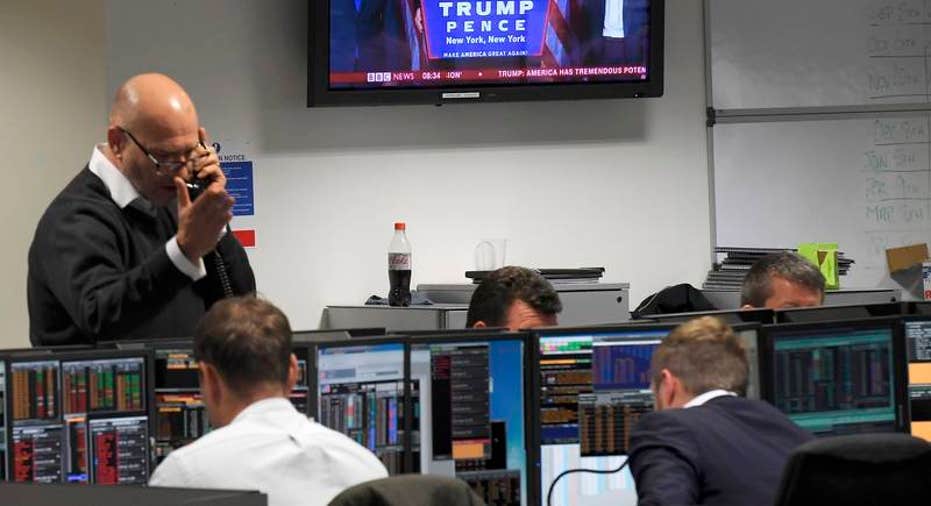Trump victory shocks global firms reliant on open trade

HONG KONG/SHANGHAI – Donald Trump's victory in the U.S. election sent shockwaves through industries that rely on open trade, from airlines to cars and IT outsourcing, although shares of some companies rebounded in afternoon trading.
Throughout his presidential campaign, Trump has vowed to revive the U.S. economy by slashing taxes, preventing companies from making products overseas, renegotiating trade accords and imposing tariffs on imports from countries like China.
"This is part of a much broader problem that we've seen in the world, in which countries are turning inwards and reacting against globalization and open borders," said aerospace analyst Richard Aboulafia, vice president of Virginia-based Teal Group.
In Asia, shares in airlines with significant exposure to global trade, such as cargo giant Korean Airlines <003490.KS>, fell as much as 5 percent as Trump closed in on the White House. Air China's <0753.HK> Hong Kong-listed shares tumbled to their lowest level since June, and automakers like Toyota <7203.T>, for whom the United States is a top market, fell 6.5 percent.
Many executives remain unsure what Trump's protectionist rhetoric will mean in practice.
Shares of the three largest U.S. airlines - American , Delta and United - rose more than 1 percent in afternoon trade.
"We would think they would be down today, but I���m thinking that it���s a play on more economic growth" from new policies, said Jim Corridore, analyst at CFRA Research. Protectionism "would be a longer term (outcome) that would hang over the industry but it's going to take a long time to get to that point."
Investors at a major Airline Economics finance gathering in Hong Kong last week expressed alarm at a surge in unconventional politics from Britain to Washington and the Philippines - a trend that many expect will leave its mark regardless of how it translates into real policies.
That comes as an industry that depends entirely on the flow of goods and people faces doubts over its own economic cycle.
POPULIST POLITICIANS
"We have seen a large section of the population that has not benefited in the past decade and we are seeing support for populist politicians with simple answers," Brian Pearce, chief economist of the International Air Transport Association told Reuters ahead of the election.
"Unfortunately, a lot of those answers are for protectionist policy solutions and air transport flourishes with open borders, so that is quite a dangerous development."
International trips make up 64 percent of global air traffic, according to IATA.
Executives at U.S. auto companies said they were concerned about Trump���s stance on free trade, especially his tough talk on the North American Free Trade Agreement. They all have production sites in Mexico.
But industry executives and analysts said aviation had a history of riding out economic and political shocks. On average, plane makers insist, air traffic doubles every 15 years.
"If there are brakes on trade, there could be some impact on international travel. But you have seen more or less 5 percent annual growth in traffic for decades," said veteran U.S. aerospace consultant Jerrold Lundquist, managing director of The Lundquist Group.
And the defense industry could benefit, as a Trump administration spends more on the military and encourages even allies to shoulder more of the security cost. Defence stocks, including listed land mine manufacturer Ishikawa Seisaku <6208.T>, jumped.
REALITY BITES?
After a bitter election campaign, trade experts said it remained unclear how Trump's statements in favor of protectionist trade measures and tough immigration controls would translate into policy.
"The honest answer is that no one knows; even Trump himself doesn't know," said Bertrand Grabowski, a managing director at Germany's DVB Bank which specializes in financing trade.
"He campaigned not on ideas but on anger and frustration."
Tighter rules could impact Indian IT services firms supporting companies in the United States. Shares in companies like Infosys and Tata Consultancy Services were sharply down as Trump closed in on the White House.
But Narayana Murthy, co-founder of Infosys and a key figure in India's outsourcing industry, said realism would prevail.
"They may fine tune it here and there, but let���s remember that he is the president of 300 million U.S. people and I���m sure he���ll do what is in the best interest of America. And what is in the best interest of America is for its corporations to succeed, for its corporations to create more jobs," he said.
For now, acquisitions at least will cool off, especially Chinese purchases of U.S. companies, as a Trump presidency pushes up regulatory scrutiny.
"If he now requires a certain percentage of manufacturing parts to be made in America, it's going to be protectionist... and that increases the risk and cost of doing business," said Stephanie Yuen, an M&A lawyer in Singapore.
"He's not just building a Mexican wall, he builds an economic wall around America."
And for key sectors, competition will heat up. Europe's Airbus and U.S. rival Boeing in the $100 billion annual jet market could become even fiercer with more government lobbying support, adding stridency to efforts to compete for jobs.
Trump's victory may also raise questions over plans to sell over 200 Western airplanes to Iran under a deal to lift sanctions that the president-elect has severely criticized.
Airbus is seen close to finalizing a tranche of 17 jets, but needs U.S. approval to complete plans for another 80 or so because the jets are built with many U.S. parts.
Boeing has U.S. approval to finalize a deal for some 100 jets but Middle East sources say progress has been slow so far.
"It further reduces the prospect of the deals going ahead," Aboulafia said.
(Additional reporting by Adam Jourdan in SHANGHAI, Norihiko Shirouzu in TOKYO, Euan Rocha in MUMBAI, Anshuman Daga in SINGAPORE, and Jeffrey Dastin in NEW YORK; Editing by Bill Tarrant and Bill Trott)



















